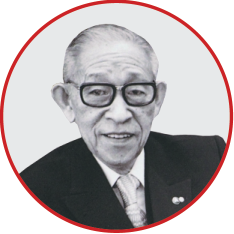
He was born in 1894, the youngest child in a family of 10.
Matsushita was sent to Osaka to be an apprentice in a charcoal brazier shop at the age of 9. With harsh experience in his early days, Matsushita always looked at difficult times with great optimism to learn, improve and strengthen himself. He started his own company, Matsushita Electric, at the age of 22.
He excelled as an innovator and a leader, turning his company into an electronics giant. Matsushita Electric's success led to visits from foreign VIPs such as United States attorney general Robert Kennedy and Indian prime minister Indira Gandhi, and the media also embraced Matsushita. He was featured in Life magazine in September 1954, and appeared on the cover of Time magazine in February 1963, bringing Matsushita Electric to worldwide prominence.
He retired as company chairman in 1973. Five years later, he spent 7 billion yen (equal to about $32 million at the time) of his own money to build the Matsushita Institute of Government and Management in the hope of training future leaders. Its graduates include people working in a wide range of fields, from politics to business, media, research and education.
Matsushita died in 1989 at age 94.
The tour that helped change a nation

The night before Deng Xiaoping embarked on the educational journey of a lifetime in 1920, he is said to have told his father that in going to France to study, his mission was "to learn knowledge and truth from the West to save China".
Deng was just 16 years old at the time.
He would spend a total of seven years in France and the Soviet Union. More than five turbulent decades later, he would be China's vice-premier. By then, of course, through the effort of hundreds of millions of Chinese, many of whom had shed blood or lost their lives, China had been well and truly saved.
But in 1978, Deng embarked on yet another journey of learning, this time looking to the expertise of the East to carry China forward on the road to modernization.
It was late October, and Deng was dispatched to Japan to officially put an end to the hostility that had pitted China against its former occupier, with the signing of the China-Japan Peace and Friendship Treaty. Those he met during his weeklong trip included Emperor Hirohito.
Deng marveled at the sophistication and modernity Japan had achieved over 40 years as it recovered from defeat in war. The thing that particularly struck him was the country's fabled bullet trains, and he decided there was no reason why the best Chinese brains should not be able to replicate that engineering feat.
One of the next things on Deng's shopping list of ideas was electronics, and if he wanted to know something about that, who better to visit than Matsushita Electric Industrial, whose home appliance brands such as Panasonic and Technics had become bywords for technical excellence throughout the world.
As Deng toured Panasonic's cavernous plant in the city of Ibaraki, near Osaka, that day, he was accompanied by the company's founder, Konosuke Matsushita, and a legion of company employees.
Deng saw television sets, video recorders and fax machines being assembled-at some points on fully automated lines-and at the end of the tour made it clear to Matsushita that what he wanted was expertise because China was about to launch a modernization drive. One of the key elements would be self-reliance, he said, but to achieve this China would need foreign know-how and investment.
"I'll do my best to help you," Matsushita told Deng.
Eight months later, Matsushita was in Beijing as a guest of the Chinese government, the two signing an agreement under which Panasonic would sell monochrome picture tubes to a light bulb company in Shanghai.


